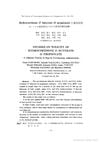 October 2023 in “Paediatrics & child health”
October 2023 in “Paediatrics & child health” The document advises health care providers on how to support transgender and gender-diverse youth with appropriate care and referrals.
 December 2013 in “Biomedical and biopharmaceutical research”
December 2013 in “Biomedical and biopharmaceutical research” Nanotechnology shows promise for better drug delivery and cancer treatment.
 April 1999 in “Therapeutische Umschau”
April 1999 in “Therapeutische Umschau” Hair loss and excessive growth treated with various options, including new laser technology.
43 citations,
July 2003 in “Andrology” Hormonal male contraception is effective and could be market-ready, but more research is needed to ensure safety for all ethnic groups.
 July 2024 in “ACS Biomaterials Science & Engineering”
July 2024 in “ACS Biomaterials Science & Engineering” Nanoencapsulated antibiotics are more effective in treating hair follicle infections than free antibiotics.
19 citations,
May 2020 in “American journal of men's health” Testosterone therapy helps boys with hormone deficiencies develop normal male characteristics and grow properly.
 3 citations,
August 2020 in “Nutrition Journal”
3 citations,
August 2020 in “Nutrition Journal” Spinach-derived thylakoid supplements plus a low-calorie diet helped obese women with polycystic ovary syndrome lose weight and improve their metabolism.
 15 citations,
September 2021 in “Frontiers in Endocrinology”
15 citations,
September 2021 in “Frontiers in Endocrinology” Hormone therapy increases the risk of heart-related issues in transgender women and may affect heart health in transgender men.
 7 citations,
February 2022 in “Journal of Personalized Medicine”
7 citations,
February 2022 in “Journal of Personalized Medicine” Platelet-Rich Plasma therapy significantly increases hair density in people with Androgenic Alopecia, and works better with more treatments per month and in younger patients.
 5 citations,
September 2021 in “Southern African Journal of Hiv Medicine”
5 citations,
September 2021 in “Southern African Journal of Hiv Medicine” The guideline provides healthcare professionals in South Africa with instructions for comprehensive, multidisciplinary gender-affirming care, including HIV prevention and treatment for transgender and gender diverse individuals.
2 citations,
July 2022 in “Sexual Medicine” Certain medications, especially 5-α reductase inhibitors and neuropsychiatric drugs, are often linked to erectile dysfunction.
2 citations,
December 2021 in “Pharmaceutics” Finasteride-loaded proniosomes effectively promote hair growth in mice.
1 citations,
November 2023 in “Medicina” Hormone therapy improves mental well-being in transgender individuals but requires ongoing health monitoring.
September 2023 in “Pharmaceutics” The new face mask with Eflornithine can potentially reduce facial hair growth and moisturize skin.
 July 2023 in “Journal of Clinical Medicine”
July 2023 in “Journal of Clinical Medicine” Choosing the right starting dose of Clomiphene Citrate for ovulation induction in PCOS women is challenging; higher BMI and hormone levels may indicate resistance to the standard dose.
 February 2023 in “IntechOpen eBooks”
February 2023 in “IntechOpen eBooks” Testosterone replacement therapy helps manage deficiency and has various methods, but requires careful monitoring to avoid side effects.
 4 citations,
December 2021 in “The journal of investigative dermatology/Journal of investigative dermatology”
4 citations,
December 2021 in “The journal of investigative dermatology/Journal of investigative dermatology” Overactive Wnt signaling in mouse skin stem cells causes acne-like cysts and shrinking oil glands, which some treatments can partially fix.
1 citations,
October 2020 in “Research Square (Research Square)” Abnormal Wnt signaling in hair follicle stem cells can lead to acne-like cysts.
 April 2016 in “Journal of Investigative Dermatology”
April 2016 in “Journal of Investigative Dermatology” MEK and BRAF inhibitors increase sebum production and accumulation, which could cause acne-like side effects.
 29 citations,
March 2019 in “British Journal of Dermatology”
29 citations,
March 2019 in “British Journal of Dermatology” Acne is significantly influenced by genetics, and understanding its genetic basis could lead to better, targeted treatments.
1 citations,
February 2024 in “Cosmetics” Cannabidiol shows promise as an effective treatment for acne.
 January 1981 in “The Journal of Toxicological Sciences”
January 1981 in “The Journal of Toxicological Sciences” Hydrocortisone 17-butyrate 21-propionate ointment caused reversible side effects like skin issues, weight gain, and organ changes in dogs.
 9 citations,
April 2023 in “Frontiers in immunology”
9 citations,
April 2023 in “Frontiers in immunology” New technologies help us better understand how skin microbes affect skin diseases.
 18 citations,
August 2018 in “The FASEB journal”
18 citations,
August 2018 in “The FASEB journal” Rabbits lacking the Hoxc13 gene show similar hair and skin issues to humans with ECTD-9, making them good for research on this condition.
 1 citations,
May 2023 in “JAMA dermatology”
1 citations,
May 2023 in “JAMA dermatology” Tight hairstyles can cause hair loss, which can be permanent if not treated early.
15 citations,
January 2019 in “Breast care” Preventive measures and effective management are crucial for reducing skin side effects in cancer treatment.
30 citations,
March 2007 in “Expert opinion on drug safety” Cetuximab often causes skin rashes, and managing these is important for cancer treatment.
14 citations,
January 2014 in “Annals of Dermatology” Some cases of folliculotropic mycosis fungoides may progress slowly and not need aggressive treatment.
 3 citations,
January 2018 in “Postępy Dermatologii i Alergologii”
3 citations,
January 2018 in “Postępy Dermatologii i Alergologii” Longer TA repeats in the SRD5A2 gene may increase acne risk in Chinese people.
 2 citations,
February 2019 in “Journal of dermatological treatment”
2 citations,
February 2019 in “Journal of dermatological treatment” A new surgical technique effectively cures acne in most patients.



















